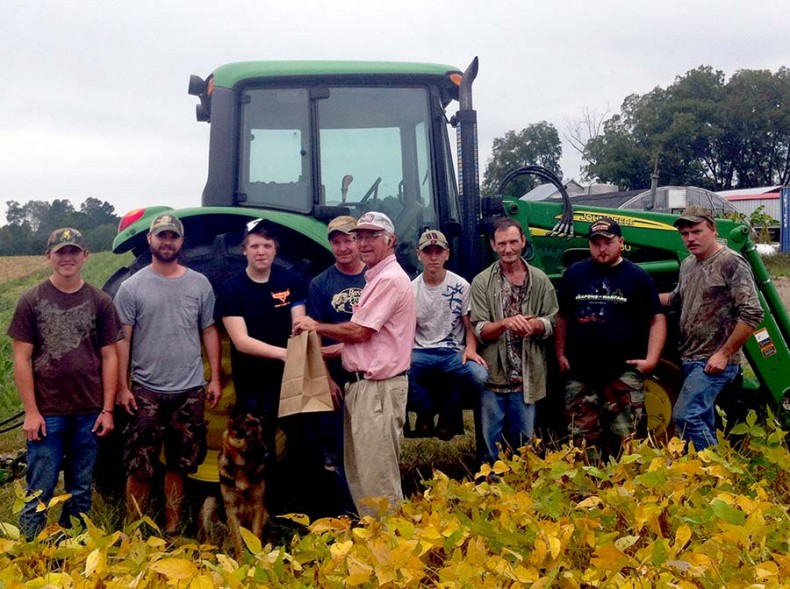Hunting for Those in Need
An innovative program keeps deer populations in check while feeding the needy
By Karen Olson HouseNutritionist Hicks shares recipes for venison at Food Bank of the Albemarle in Elizabeth City. Photo courtesy of Food Bank of the Albemarle.
A farmer participating in FCMD’s farm hunting program in Columbus County
This hunting season, some deer hunters are targeting hunger through an innovative initiative that feeds impoverished people in need.
The Farmers and Communities Manage Deer (FCMD) program encourages licensed hunters to harvest white-tailed deer and donate them to drop-off sites and participating processing facilities. After processing and packaging, the venison is distributed to local relief organizations that welcome the lean, protein-rich meat.
At Food Bank of the Albemarle, a regional food clearing house based in Elizabeth City, Della Hicks comes in weekly to educate clients about venison. A nutritionist with the Pasquotank County Cooperative Extension office, Hicks prepares and shares recipes such as stews and chilies.
“A lot of clients were hesitant since they hadn’t had venison before,” says Rod Sershen, the bank’s food resource manager. “But they said they couldn’t tell the difference between it and beef.”
Over the past two deer seasons, more than 23,000 pounds of venison burger (roughly 75,000 servings) has been distributed where communities have embraced the program. Originally funded for five eastern counties in 2012, there are currently 11 counties now with donation sites: Beaufort, Bladen, Columbus, Edgecombe, Franklin, Hyde, Jones, Pasquotank, Washington, Wayne and Wilson. The program addresses two big problems: human hunger and costly damage by deer. North Carolina has regularly ranked within the top lists for the highest percentage of its citizens experiencing food shortages in the nation since 2010. In 2015, it ranked 13 in the U.S. for food hardship, according to a Food Research & Action Center study.
Concerns about controlling the deer population include potential spread of disease and dangerous vehicle collisions. Annually, deer cause the vast majority of $30 million in crop loss suffered by N.C. row crop farmers.
Farmers who participate in the program, allowing hunters access to their land, can reduce the potential for crop damage and can profit from hunting programs developed through FCMD. Hunters typically pay a minimum of $75 for a doe hunt, for example. A number of participating landowners, such as Lumber River Outdoors and Rutaa Branch Hunting Club, both based in Cerro Gordo, offer lodging and other outdoor recreation opportunities for added fees. Communities also enjoy an economical boost when visiting hunters purchase gas, eat at local restaurants and buy supplies.
“We can help landowners establish hunting programs and implement community deer donation sites as well. There are a number of options,” says program manager Liz Rutledge. Rutledge is a wildlife specialist with the NC Wildlife Federation, which oversees FCMD.
Deer donation event with mobile cooler at Chocowinity Volunteer Fire Department in Chocowinity. Photo courtesy of FCMD.
Insured groups willing to assist farmers by conducting free organized fall hunts on their properties include the NC Bowhunters Association (ncbowhunter.com) and Cross Trail Outfitters, a ministry group with chapters across the state that mentors youth through hunting (teamcto.org).
FCMD relies on community organizations and businesses, including churches, civic groups and hunt clubs, to maintain deer drop-off donation centers and provide financial support for the program. Groups, farmers and other landowners can host community festivals, wild game dinners and deer donation events to raise funds and otherwise assist the program.
Financial support for FCMD comes from the NC Tobacco Trust Fund Commission. FCMD partners with The NC Hunters for the Hungry, Inc.®, a nonprofit organization founded in 1993 (nchuntersforthehungry.org). This integral collaboration leverages several resources, including the provision of numerous NCDA&CS inspected deer processing facilities.
Want to get involved?
Visit ncwf.org and/or contact Liz Rutledge at 828-783-8013 or Liz@ncwf.org.
-
Share this story:






